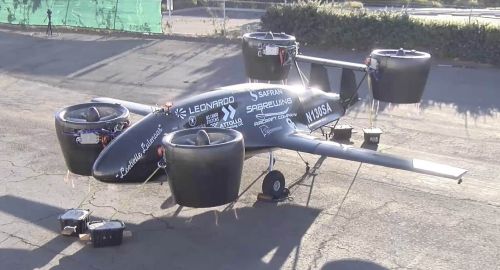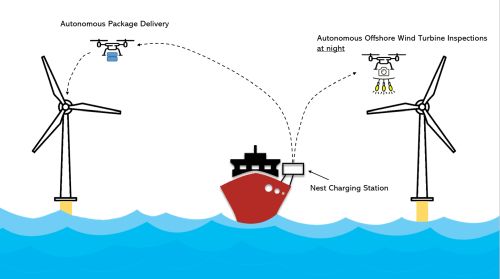Ameriflight plans to purchase cargo drones from Natilus and Saberwing, a plan for autonomous wind turbine inspections and repair, the American Security Drone Act, an arrest made for flying a drone at Dublin airport, a new hydrogen-powered octocopter drone, and Green and Blue UAS.
UAV News
Ameriflight adds 35 heavy-duty cargo drones to wish list
Ameriflight is a regional cargo airline (Part 135) that operates 156 turboprop twins for customers such as FedEx, UPS, and DHL. They recently signed a tentative agreement with Natilus for pilotless cargo planes. Now Ameriflight has signed a Letter of Intent to purchase 35 VTOL cargo drones from Sabrewing Aircraft Co.
Ameriflight has 15 bases across the Western Hemisphere with 200 service destinations throughout the United States, Canada, and Mexico, as well as the Caribbean and South America. They typically experience over 1,500 weekly departures.
The Natilus agreement to purchase is for the Kona aircraft, a 3.8-ton payload, short-haul feeder uncrewed aerial vehicle. Nautilus says the Kona planes will be operated by remote control and have the ability to be fully autonomous at some point in the future.
Project Using Automated Drones for Offshore Wind O&M Aims for Reducing Downtime and CO2 Emissions
The Flexible Offshore Drone for Wind (FOD4Wind) project envisions a system that can conduct autonomous wind turbine inspections and repair as well as package deliveries from service operation vessels to offshore turbines.
Drones would take off from service operation vessels and carry gear and tools to the nacelles of Siemens offshore wind turbines. The Upteko partner says “If we can replace sailing with drone flights from larger ships, then many of the trips around the wind farm will be saved. There is great potential in that – both in terms of time and CO2 emissions.”
The project, which runs until the end of 2024, is first working with payloads of 12 kilograms, with a long-term goal for the drones to be able to carry a cargo of up to 100 kilograms.
The FOD4Wind project is being undertaken by Siemens Gamesa (produces wind turbines), ESVAGT (operates the service operation vessels), Upteko (developer of the automated UAS), and the University of Southern Denmark (SDU) with Energy Cluster Denmark managing FOD4Wind.
Warner, Scott Introduce Legislation to Ban Purchase of Drones Manufactured in Countries Identified as National Security Threats
The American Security Drone Act of 2023 was introduced by U.S. Sens. Mark R. Warner (D-VA) and Rick Scott (R-FL)
Senator Warner: “…the purchase of drones from foreign countries, especially those that have been deemed a national security threat, is dangerous. I am glad to introduce legislation that takes logical steps to protect our data from foreign adversaries and meanwhile supports American manufacturers.”
Senator Scott: “I’ve been clear for years: the United States should never spend taxpayer dollars on anything made in Communist China, especially drones which pose a significant threat to our national security. Xi and the Communist Party of China are on a quest for global domination and whether it’s with spy balloons, TikTok or drones, they will stop at nothing to infiltrate our society and steal our data.”
The American Security Drone Act:
- Prohibits federal departments and agencies from procuring certain foreign commercial off-the-shelf drones or covered unmanned aircraft systems manufactured or assembled in countries identified as national security threats, and provides a timeline to end the current use of these drones.
- Prohibits the use of federal funds awarded… to state or local governments from being used to purchase [these drones].
- Requires the Comptroller General of the United States to submit a report to Congress detailing the amount of foreign commercial off-the-shelf drones and covered unmanned aircraft systems procured by federal departments and agencies from countries identified as national security threats.
The legislation is cosponsored by Sens. Marco Rubio (R-FL), Richard Blumenthal (D-CT), Marsha Blackburn (R-TN), Chris Murphy (D-CT), Tom Cotton (R-AR), and Josh Hawley (R-MO).
Man accused of flying drone at critical area of Dublin Airport
They charged the man under section 43 of the Air Navigation and Transport Act, 1988. He is accused of knowingly flying a drone into the critical area of Dublin Airport which interfered with the operation of an aerodrome on July 2nd, 2022. The 41-year-old was remanded on bail to appear again on March 21, 2023. Meantime, he’s banned from flying drones and going within two kilometers of the airport.
Commercial and military hydrogen drone unveiled by Heven Drones
Israel-based Heven Drones unveiled its H2D55 hydrogen octocopter drone. It can fly for over 90 minutes with a 15-pound payload. This is the first in a series of hydrogen-fueled drones to be released. The others will have longer flight times and greater payload. The drones are built to spec and take two-three months to complete. The price is not announced
The drones are built in-house, in a 20,000 sq. ft. production facility adjacent to R&D and administrative offices in the North of Israel. Up to 200 fully customizable drones per month can be built at the current capacity.
AUVSI Green UAS: Expanding the Pool of Trusted Drone Options
Green UAS is part of AUVSI’s Trusted Cyber Program, which seeks to verify a greater number of commercial UAS in line with the highest levels of cybersecurity and National Defense Authorization Act (NDAA) supply chain requirements.
AUVSI launched the Trusted Cyber Program in August 2022 in collaboration with cybersecurity firm Fortress Information Security.
Green UAS is an industry-standard assessment process that mirrors the Defense Innovation Unit (DIU)’s Blue UAS certification program. It is administered by AUVSI to vet drones that are seeking Green UAS certification. Green-compliant drones that have a DoD customer/sponsor willing to sponsor and fund a DoD Authority to Operate (ATO) will have the opportunity to transition from the Green UAS cleared list to Blue UAS cleared list.
Green UAS builds on the Defense Innovation Unit (DIU)’s Blue UAS certification program, an approach to rapidly prototyping and scaling commercial UAS technology for the DoD. Green UAS is meant for customers without an immediate need for Department of Defense (DoD) authority to operate and provides a more straightforward pathway to the Blue UAS 2.0 cleared list.


